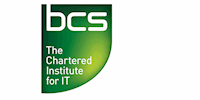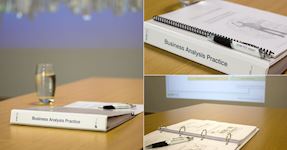BCS Business Analysis Practice | part of the BCS Diploma in Business Analysis
COVID-19 Update: Attend from home - Live Online tutor-led classroom course with interactive group exercises.
TCC Training and Consultancy
Summary
Debit/Credit Card
Bank Transfer
Purchase Order
- Exam(s) / assessment(s) is included in price
- Tutor is available to students
Add to basket or enquire
Location & dates
BIRMINGHAM
West Midlands
B46TB
United Kingdom
4-12 Norton Folgate
LONDON
E16DQ
United Kingdom
Portland Street
MANCHESTER
Lancashire
M13HU
United Kingdom
Overview
TCC’s BCS Business Analysis Practice (formerly ISEB Business Analysis Practice) course provides the fundamental skills and framework needed by effective business analysts engaged in a business change project. An integral case study allows delegates to apply best practice analysis techniques, working with others to model an organisation and identify the opportunities for business improvement. The course follows the business analyst's involvement throughout the project, right through to post-implementation benefits realisation.
What’s Included?
In the classroom:
- Expert Business Analysis trainer
- Copies of all presentation slides (exclusive to TCC)
- Comprehensive written notes (exclusive to TCC)
- Practical classroom group exercises
- A realistic case study which runs consistently throughout our BCS business analysis courses
- Maximum class size of 12
At TCC training venues:
- A modern and comfortable training room
- Buffet or restaurant lunch and light breakfast selection*
- Hot & cold refreshments throughout the day
* Light breakfast selection available on city centre courses in Birmingham.
What TCC Customers Are Saying:
“The course was very detailed and links well to other BA courses. Very relaxed atmosphere conducive to questions and learning. Good that the exercises are consistent throughout all courses. Homework good. Really enjoyable course. I'm looking forward to the next one.” – Nathalie N
* SAVE £582 with our BCS Diploma in Business Analysis Training Passport *
To be awarded the Diploma in Business Analysis, you must complete four BCS Business Analysis training courses:
- BCS Business Analysis Practice (3 Days)
- BCS Requirements Engineering (3 Days)
- BCS Organisational Behaviour (2 Days)
- BCS Modelling Business Processes (2 Days)
You are then eligible to sit the BCS Business Analysis Diploma Oral Examination covering all four modules.
This course can be purchased as part of a Training Passport, which includes the training and examinations for all four courses leading to the BCS Diploma in Business Analysis for only £3,495 + VAT. A Training Passport allows you to register for any of the dates on our public schedule, at a considerable saving over booking each course and exam individually.
You can complete the courses in any sequence. However, we recommend starting with either Business Analysis Practice or Requirements Engineering.
Certification
BCS Practitioner Certificate in Business Analysis Practice
Course media
Description
Course Objectives
This course will enable delegates to:
- Demonstrate an understanding of business strategy and strategic analysis techniques
- Act as effective members of a team investigating an organisation's business systems with a view to recommending business improvements
- Apply techniques in order to analyse and model business systems
- Identify recommendations for business improvement
- Assist in the production of a rigorous business case covering the development and implementation of business changes
- Identify how business requirements may be supported by IT systems
- Prepare for the BCS Certificate in Business Analysis Practice
Course Content
Rationale
A lifecycle for business change
The role of the Business Analyst vs. the Systems Analyst
Purpose of analysing and modelling business systems
Strategic Analysis in Context
Environment analysis and SWOT
Overview of areas strategy including IS strategy
Critical success factors and key performance indicators
The Balanced Business Scorecard
Project Discipline for Business Analysis
Terms of reference/project initiation
Business and project objectives
Deliverables from business analysis
Understanding the Situation and Business Perspectives
Stakeholder analysis and investigative techniques
Identifying and defining business perspectives
Identifying and resolving conflicts
Analysing and Modelling Business Activities
Identifying activities and dependencies
Building a Business Activity Model (BAM)
Business events / activity indicators
Rules and constraints
Identifying Potential Solutions
Creative approaches to problem solving
Gap analysis
Defining a new business model
Identifying Requirements for the New Business Model
Presenting the business case and options for change
Cost-benefit, risk and impact analysis
Risk analysis and management
Accepting the Business Case
Testing the system for user acceptance
Managing the implementation of change and benefits realisation
Who is this course for?
- Business Analysts and Systems Analysts
- Business Managers
- Developers
- Project Managers and Team Leaders
- Quality Assurance and Quality Control Managers
Requirements
There are no pre-requisites for the course.
Career path
Business Analyst
£43,861 - £52,682 estimated salary based on Reed salary checker (top 4 locations).
What do they do?
Business Analysts (known as BAs) are responsible for analysing a business’s processes and investigating how they work. They then identify improvements that can be made and present the case for these improvements back to the business.
Questions and answers
Reviews
Currently there are no reviews for this course. Be the first to leave a review.
Legal information
This course is advertised on reed.co.uk by the Course Provider, whose terms and conditions apply. Purchases are made directly from the Course Provider, and as such, content and materials are supplied by the Course Provider directly. Reed is acting as agent and not reseller in relation to this course. Reed's only responsibility is to facilitate your payment for the course. It is your responsibility to review and agree to the Course Provider's terms and conditions and satisfy yourself as to the suitability of the course you intend to purchase. Reed will not have any responsibility for the content of the course and/or associated materials.



